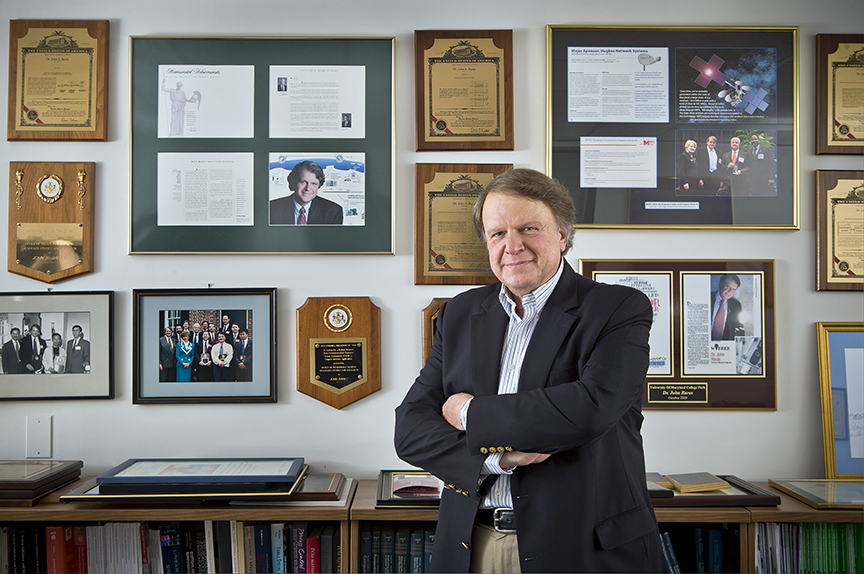News Story
Baras gives invited tutorial at WPMC'11
On Oct. 3, Professor John Baras (ECE/ISR) gave an invited three-hour tutorial at the 14th International Symposium on Wireless Personal Multimedia Communications (WPMC’11), in Brest, Bretagne, France.Baras spoke on “Wireless Information Infrastructures and the Future Internet: Protocol Components, System Architectures, Security and Privacy.” The talk explored several topics critical to broadband communication infrastructures, which are expanding rapidly and are becoming ubiquitous. Baras presented a new methodology to design wireless communication network protocols based on the decomposition of protocols into fundamental components and the use of optimization techniques for tradeoff analysis and synthesis. The new formal and model-based approach allows a systematic study of network performance and cross-layer analysis and design of routing, scheduling, MAC and PHY layer protocols. This approach, called Component Based Networking (CBN), combines and extends ideas and methods from component-based software engineering, formal models, performance models, optimization and trade-off analysis, compositional synthesis.
Trust and reputation are critical concepts in networks – communication, control, computer, social, web-based, economic, biological. Trust evaluation leads to the development of relations and collaborations. These evaluations are based either on direct ‘communal’ monitoring and inference by the nodes, or on indirect references and credentials. Baras described new fundamental ways for analyzing and evaluating trust in autonomic networked systems. The indirect evaluation process is modeled as a path problem on a directed graph, where nodes represent entities, and edges represent trust relations. He described a novel formulation of trust computation as ‘linear’ iterations on partially ordered semirings, and demonstrated how this theory can be used to analyze several key problems on the performance of trust algorithms. He presented the methodology of constrained coalitional dynamic games that he has developed for studying the effects of trust on collaboration.
He described and solved various problems of wireless network security, information assurance and trust in dynamic wireless networks. These included detection and defense against attacks, detection of propagating viruses, evaluation of intrusion systems, attacks at the physical, MAC and routing protocols, trust establishment-dynamics-management. Authentication is the process where claims of identity are verified. Most mechanisms of authentication (e.g., digital signatures and certificates) exist above the physical layer, though some (e.g., spread spectrum communications) exist at the physical layer often with an additional cost in bandwidth. Baras introduced a general analysis and design framework for authentication at the physical layer where the authentication information is transmitted concurrently with the data. He described further extensions to OFDM and multicarrier wireless devices. He also described several other methods for authentication and security at the physical layer including the use of signal characteristics to authenticate mobile wireless devices, the discovery of unshakable physical characteristics in fingerprint sensors, the use of special-purpose trusted chips for increasing the security of portable computers and wireless devices and the use of hardware-based security towards establishing compositional security schemes.
Social networks over the web are also becoming ubiquitous and pose a unique set of challenges stemming primarily from the interactions of humans and technological networks. Dr. Baras described new approaches in modeling and analysis of social networks and their dynamics including geometric and algebraic models, security and trust, privacy, reputation systems. Again the emphasis was on an integrated systems perspective and the need for appropriate model-based analytics. He closed with an integrated model of the communication, information and cognitive layers of future networks and a description of certain foundational problems it implies for networked systems.
About the symposium
The WPMC symposia series were inaugurated in 1998 at Yokosuka Research Park, Japan, as a global platform which aims at enabling collaboration in the field of wireless information and multimedia communications. Held in Asia, Europe and America, WPMC has established itself as a unique global conference dedicated to wireless multimedia convergence. In the conference, more than 120 papers were presented on the following topics: MIMO, OFDM, propagation and channel modelling, cognitive radio, hardware and software radio, radio resource management, optical wireless communications, trials on 3G/4G networks, MAC, relay and cooperative communications, ad-hoc networks, multihop networks, sensor networks, sensors: location and event detection, video transmission, broadcast and multicast, energy-efficient networks, communication and network technologies for new services.
Published October 3, 2011





